According to a new study from the University of Illinois at Chicago in the United States, people with poor oral hygiene may be at greater risk of developing Alzheimer’s disease.
Alzheimer’s disease is the most common form of dementia, affecting more than 560,000 Canadians. In its early stages, memory loss is mild; however, as the disease progresses, the cognitive decline becomes serious enough to interfere with the completion of daily life activities such as driving, paying bills, or preparing meals.
Gum disease, also referred to as periodontal disease, is a common infection that causes gum tissue damage and possible bone loss. Since bacteria in the mouth can enter the bloodstream when people eat or brush their teeth, it can travel to other parts of the body.
A team of researchers from the University of Illinois at Chicago in the United States investigated whether bacteria from the mouth could, when reaching the brain, trigger an immune system response causing neuron damage and symptoms such as confusion and deteriorating memory. They published their results in PLOS ONE.
Over 22 weeks, the research team studied 10 mice exposed daily to periodontal bacteria. The control group consisted of 10 non-treated mice. After the study, the mice were euthanized, and their brains were examined. The researchers found DNA from the periodontal bacteria in the brain tissue of the treated mice as well as bacterial proteins inside their neurons.
Additionally, there was an increased expression of genes associated with inflammation and degeneration in the brain tissue of these mice. Indeed, Dr. Watanabe stated that they were surprised by the extent to which the periodontal pathogen impacted brain health.
However, while this study indicates that chronic periodontal infection was associated with greater inflammation and neural degeneration, the findings in this study were based upon 10 mice. If in the future this study can be replicated and improved, poor oral hygiene may then come to be viewed as a risk factor or predictor of Alzheimer’s disease.
Written by Debra A. Kellen, PhD
Reference: Ilievski, V., Zuchowska, P. K., Green, S. J., Toth, P. T., Ragozzino, M. E., Le, K., … & Watanabe, K. (2018). Chronic oral application of a periodontal pathogen results in brain inflammation, neurodegeneration and amyloid beta production in wild type mice. PloS one, 13(10), e0204941.https://doi.org/10.1371/journal.pone.0204941



